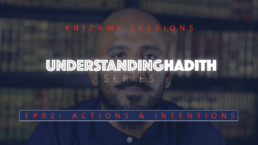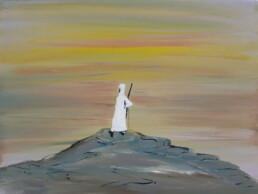Understanding the six fasts of Shawwal
This is a short post which seeks to help people understand the six fasts of Shawwal. They are not meant in and of themselves as stand-alone fasts but are intrinsically connected to Ramadan and meant to be performed in a particular way. The following is a brief explanation:
1. Ramadan has a number of purposes and has done from primordial times when the lunar month was called by another name in an earlier language and culture (such as Noah's or Abraham's). Amongst them is to familiarise one’s self with refraining to indulge core impulses and base desires – it’s not merely about feeling hungry and thirsty. The final Prophet lamented, “Perhaps a person fasts and achieves nothing from his fast except hunger and thirst...” (al-Nasā’ī)
2. Shawwal is the 10th Arabic month of the Hijri calendar. The first day of Shawwal represents the end of Ramadan, and so God appointed it as a 'Festival for the end of fasting' (Eid al-Fiṭr) - to glorify God and celebrate His guidance. It is related by Abu Ayyub al-Ansari that the Prophet said: "Whoever fasts Ramadan and then follows it up with six fasts in Shawwal, it's as if he fasted a lifetime (al-dahr)." (Muslim) Jurists also took al-dahr to mean “a year” based on the hadith of Thawbān.
3. What do the six fasts of Shawwal speak to? Well if we hold that fasting Ramadan is to temper the sway of base desires, then it makes sense that rather than abruptly ending an ongoing exercise and diminishing it's institution, there's a pause to allow the body to recuperate but then a follow up with six fasts to reinforce the newly learned behaviour for longer and sustained effect, at least for the rest of the year until the next Ramadan. This might speak to the point the Prophet made, “it's as if he fasted a lifetime/a year” as in it would help to restrain his nafs (base self) in the long term by cementing important constricting habits. Fasting the three middle days of a lunar month (ayām al-bīdh) seems to also serve a similar purpose.
4. From this we learn that:
- these fasts are a follow on after a month of fasting. They're not meant in and of themselves (لذاتها) as stand-alone six fasts. Without following Ramadan, they do not serve the purpose for which they are intended.
- it is the Ramadan fasts that are the ultimate mechanism that God instituted for human benefit, and fundamental to the Abrahamic way. Nothing comes close to them in sanctity or value. It something else did, God would’ve obligated those as well. This goes for all obligatory acts - there's a reason they're obligatory.
So (hopefully) having made this clear, the following ought to be taken into consideration:
1. These six fasts are optional. They're not simply highly encouraged as some make out and then pressure others into, but they are virtuous for the reasons outlined above. Those hesitant to fast because they need a break, or having found Ramadan particularly difficult, should not feel pressured to fast out of social conformity or the fear that they'll be socially disparaged. (If you are disparaged by your cohort, then it's a sign that you really need to check your social circle and their religious literacy level.)
2. In general, these fasts should be performed towards the end of Shawwal, and in brief, for two reasons: so that we strongly differentiate between the key fasts of Ramadan and these six add-ons; and so that reinforcing advantageous constricting habits takes place in an optimum way. Imam Malik b. Anas discouraged people from fasting in Shawwal for the first reason, and Imam Abu Hanifah discouraged fasting straight after the festivities. Malik added that the the early Muslims (salaf) wouldn’t fast the six, nor the learned and righteous of Madinah, fearing that it was a blameworthy innovation (bid'ah). Given the hadith of Abu Ayyub, what he perhaps meant (as innovation) was that people would take the six as being comparable to the Ramadan fasts or overstate its significance. Furthermore, it may be the case that there wasn't a culture of fasting the six in Madinah either because it was deemed that Ramadan sufficed, or because of the nominal reporting of the hadith suggests that it was said to specific persons for specific reasons which many felt didn’t apply to all.
3. If we except that these fasts are a follow on after a month of fasting, it makes sense that those who have to make up Ramadanic fasts (out of travel, sickness, menses, etc) do so before fasting six days, and that's not to mention the explicit wording of the hadith: "Whoever fasts Ramadan *and then follows it up..." Furthermore, making up the Ramadanic fasts in Shawwal serves a similar purpose to the six in that they follow up Ramadan and similarly reinforce the nafs-constricting proclivities, so in such situations where one might run out of time to perform the six Shawwal fasts due to making up the Ramadanic ones, it isn't necessarily a loss.
4. As for those who boil it all down to ritualistic acts and ajr (reward) seeking, I sincerely commend the simple and sincere desire to please God, but the main point of the six fasts might be getting lost. This deen is one of insight, intelligence, and meaningful purpose.
And God knows all things as they are in reality.
Some clarifications on zakat
Zakat is the third pillar of subservience to God and, as such, one would assume that anyone claiming to be subservient (i.e. muslim) would fully understand what is expected of him/her. However, that’s often not the case, and there’s a dire need to educate believers on what God expects. This post offers some basic clarifications of popular misunderstandings. They’re not intended to be scholarly with an array of justifications and evidence, nor will they deal with context-specific applications. Rather they will simply outline general propositions on some elementary but often misunderstood matters:
Can we perform Eid Salat (prayers) at home?
Yes, and furthermore, I believe we should!
Here I’d like to distinguish between two things:
- The communal Eid prayer
offered in an open space (or mosque) with the subsequent sermon, - Offering two units of
prayer for the special occasion of Eid.
Now of course, for those living under lockdown, unfortunately
the first is unfeasible. But this does not preclude the second, and I believe it
is virtuous to perform two units of prayer for the special occasion of Eid, and
it is what God wants from believers.
How so?
Has God forbidden a faded haircut?
I have been asked this question profusely over the past couple of years, and so I have written these few points to provide some clarity to the confusion caused by laymen who have taken it upon themselves to circulate uncontextualised/mistranslated hadith, and anonymous rudimentary responses (fatwas). It is offensive to God and such responses consistently demonstrate an absence of competency in the law. Even beyond this issue, I advise believers to take their faith consistently from those they trust and pay no attention to what floats about on the internet, irrespective of whether a verse or hadith is quoted, or an ancient scholar cited. If it was that easy, there would be no need for anyone to actually study.
The need for an Abrahamic overview
When we think of public ventures, we think of concentrated efforts in particular realms. The problem, however, is that such efforts can only be conducted fruitfully where we’re motivated by:
- an accurate understanding of our deen,
- what it means to be a Muslim and a true believer, and
- what shar’ī objectives precisely look like.
The sharī’ah is the key to human flourishing, normative guidance that works for all people, everywhere. As an abstract concept it is not centric to a time, a place or a people. It is guidance and a collection of standards that can be applied to any context: generating/producing specific solutions, remedies, or direction that's specifically action-guiding.
But Muslims in the West have narrowed the
scope of the sharī’ah of Allah and stripped it of its relevance. What God sent
as guidance in Revelation is for all of mankind. Yet we've created an “Immigrant
Islam” defined by its minority status and foreignness (for an extended
discussion on Immigrant Islam, see Sherman Jackson’s Islam and the Blackamerican). We have prioritised ethnic interests of representation (both social
and political) of immigrant Muslim communities.
What I’ve learnt from Twitter engagements
There's a lot said about Muslim Twitter (MT) being toxic, but I think it extends to most corners of Twitter. Let's be frank, there are trolls and delinquents everywhere. I've been on Twitter approximately two years now and when I joined, I didn't even know there was such as thing as MT. But soon after I was cautioned to its nature, and like most things I engage with for the first time I looked at it primarily as a learning experience.
So, here are some brief reflections:
Should we build or rectify?
Islam attracts all sorts of people, from those looking for a sense of community, fleeing a dysfunctional life, or looking for a cause, to those who aren't necessarily looking for something but simply come to be convinced of the genuine Abrahamic conception of God and the wider existential narrative preached by his descendant, Muhammad, the final messenger of God.
Yet one thing I've consistently noticed over a decade is how community leaders, activists and Muslim spokespersons are rarely (if at all) from the latter. They tend to either be those who found a (secular) cause in Islam or saw the faith as an extension of their ethnic identity that they were attempting to protect against rising racial prejudice we see across western societies. Very rare has it been to have someone speak on behalf of the faithful who simply believes Islam is a justifiable and convincing position to hold and has little baggage from the past. One would have had to have thought about these things deeply and engaged with the revealed word, which very few seem keen on actually doing.
Can we hold a mushaf and perform tarāwīh/qiyām?
Yes, certainly.
I strongly believe it is perfectly permissible to do so.
Al-Bukhārī relates that A’ishah b. Abī Bakr, the wife of the
Prophet, would have her servant Dhakwān lead her in prayer from the mushaf.
There also doesn’t seem to be any explicit prohibition from doing so.











